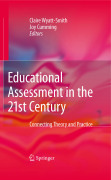
Educational assessment in the 21st century: connecting theory and practice
Wyatt-Smith, C.
Cumming, J.
Even in the white heat of the ever-present education debate, assessment is one of the hottest and most contested topics. While teachers develop practical methodologies such as Assessment for Learning, that aim to bring positive benefits to learners, governments and policy-makers strengthen the role of externally mandated assessment for accountability purposes. With the field of assessment a key focus for research the world over, the traditional issues of the topic, such as validity and reliability, have been joined by a host of other issues all pressing for attention. These include: the value of testing for international benchmarking and public reporting; taking account of cultural and socialdiversity; new modes of testing and assessment; technological innovation; theissue of what counts as authentic assessment; and inclusion and disability issues in assessment. A host of internationally recognized authors explore the latest ideas on the future of assessment Provides readers with a range of theoretical and methodological viewpoints Includes an explanation of the authors’ frameworks to enhance both knowledge of different theories and understanding ofviewpoints Up-to-date and forward-thinking, reflecting newly emerging educational priorities INDICE: From the contents Preface: Signs of change: Assessment past, present and future. 1 Framing assessment today for the future: Issues and challenges. Part 1 Creativity and innovation in assessment: New skills and capabilities, and changing communication practices. 2 Assessment in the perspective of a social semiotic theory of multimodal teaching and learning. 3 Transforming K–12assesment: Integrating accountability testing, formative assessment and professional support. 4 Assessment issues and new technologies: ePortfolio possibilities. 5 Towards theorising assessment as critical theory. Part 2 Building social capital: Difference, diversity, social inclusion. 6 Fairness in assessment. 7 Assessment, gender and in/equity. 8 Assessment, disability, student engagement and responses to intervention. 9 Assessment challenges, the law and the future. Part 3 Assessment in context: Geography, policy and practice. 10 Teachers’ use of assessment data.
- ISBN: 978-1-4020-9963-2
- Editorial: Springer
- Encuadernacion: Cartoné
- Páginas: 280
- Fecha Publicación: 01/04/2009
- Nº Volúmenes: 1
- Idioma: Inglés
